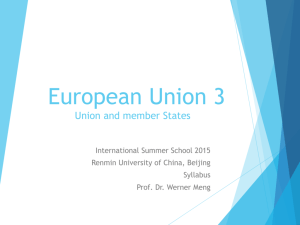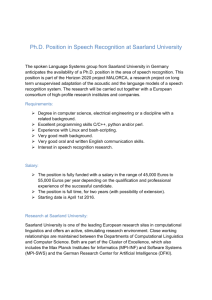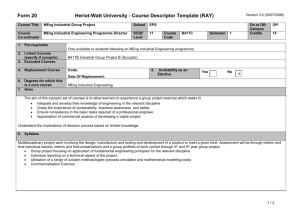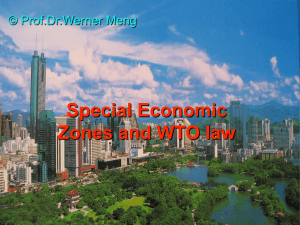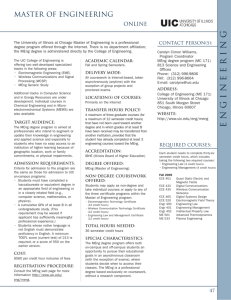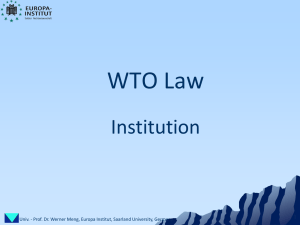Admission and Establishment
advertisement
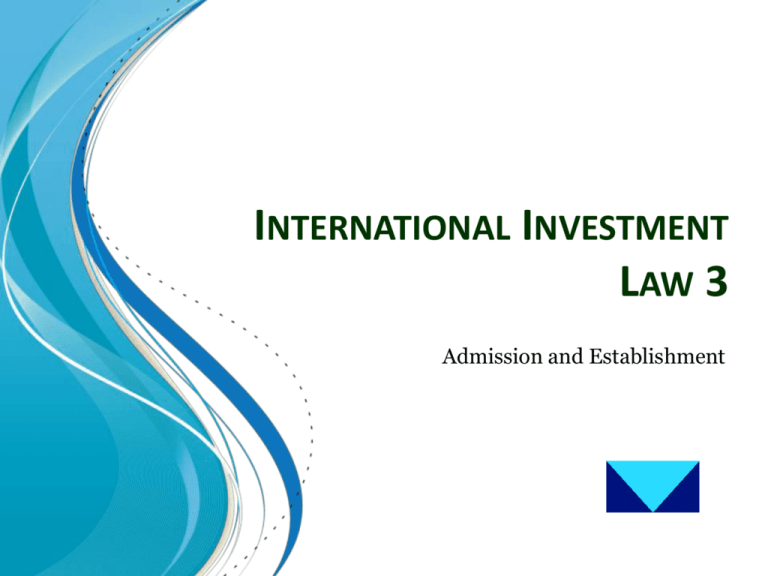
INTERNATIONAL INVESTMENT LAW 3 Admission and Establishment Admission of Foreign Investment • General PIL: No state has to admit FI if it has not promised so in an Investment Treaty • Longterm admission: establishment • Right of admission may be granted only for sectors, regions or particular forms of investment like joint ventures • European investment treaties restricted to granting rights to those investors that have been admitted unilaterally • US, CND, J: Treaties that grant direct rights of market access through establishment • Economic Interest: see Washington ConsensusExport of Capital Prof. Dr. Werner Meng, Saarland University, Germany Foreign Investment • Authorization (or limitation) of cross-border capital transactions – Import of capital – Export of capital – Investment authorization • In the EU, 3.3 trillion € were invested in foreign countries, compared to 2.4 trillion € coming from foreign countries in 2008 Prof. Dr. Werner Saarland Prof. Dr. Werner Meng Meng, - Europa InstitutUniversity, - Saarland Germany University 3 Export of Capital • Authorization or promotion – Free flow of capital as a basic freedom – Tax shield (avoiding double taxation) • Objections or reasons for restrictions – Capital outflaw – Export of jobs – Dependence on the economic development in the foreign country – Sanctions for political reasons – Monetary policy reasons: balance disturbed Prof. Dr. Werner Saarland Prof. Dr. Werner Meng Meng, - Europa InstitutUniversity, - Saarland Germany University 4 Import of Capital • Promotion – Capital increase – Investment incentives (taxes, infrastructure), „Investment climate“ – Expecting an additional increase in taxes • Supervision – Limitations for objective reasons (e.g. for safety reasons) – Upper limits – Joint venture requirements • Inhibition or restriction – – – – – Preferring national investors over foreigners Reasons of monetary policy Security policy reasons Limitation of profit transfer Fear of dominant influences by TNUs Prof. Dr. Werner Meng, Saarland University, Germany 5 Losses of Jobs due to FDI • Study of Copenhagen Economics – In 2001-2006, the FDI (investment of EU companies outside the EU) increases the gross domestic product by 20 billion €. – 13 billion € of these are income increases of labor. • Relatively mostly of qualified employees – When100 jobs are exported, 50 are immediately recreated domestically. In addition, there are indirect profits. – In addition, a possible loss in competitive capacity has to be taken into account in the total calculation. – 50 % of world trade happens between interconnected companies. I.e.: FDI promotes also the international trade of the EU. See Communication from the Commission 7.7.2010 COM(2010)343 final Prof. Dr. Werner Meng, Saarland University, Germany 6 Aspects of the „Investment Climate“ • Development of interest rates • Profit transfer possible • Tax incentives and disincentives – Tax level, tax relief – Double taxation • Infrastructure • Political risks • Legal framework Prof. Dr. Werner Meng, Saarland University, Germany 7 Washington Consensus – 1 • (John Williamson 1989) • Fiscal policy discipline, with avoidance of large fiscal deficits relative to GDP; • Redirection of public spending from subsidies ("especially indiscriminate subsidies") toward broadbased provision of key pro-growth, pro-poor services like primary education, primary health care and infrastructure investment; • Tax reform, broadening the tax base and adopting moderate marginal tax rates; • Interest rates that are market determined and positive (but moderate) in real terms; • Competitive exchange rates; Washington Consensus - 2 • Trade liberalization: liberalization of imports, with particular emphasis on elimination of quantitative restrictions (licensing, etc.); any trade protection to be provided by low and relatively uniform tariffs; • Liberalization of inward foreign direct investment; • Privatization of state enterprises; • Deregulation: abolition of regulations that impede market entry or restrict competition, except for those justified on safety, environmental and consumer protection grounds, and prudential oversight of financial institutions; • Legal security for property rights. Prof. Dr. Werner Meng - Europa Institut - Saarland University 9 Standards of Admission • Most favored nation clause – No discrimination btw. foreigners • National treatment – No discrimination btw. foreigners and nationals • Restrictions through – Positive lists or – Negative lists • Performance requirements – E.g. local content, export duties, hiring local workers etc. – Limited by the TRIMS agreement: Art. III and XI GATT are applicable • Lawfulness of the investment – E.g. no bribes or other corruption – Waiver by toleration for some time Prof. Dr. Werner Meng, Saarland University, Germany
